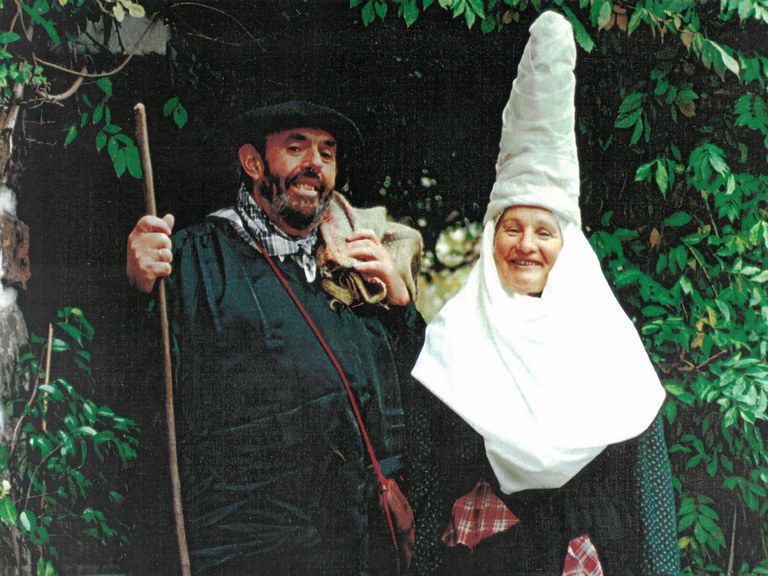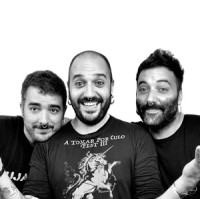“Without femínids, ethical non-monogamy is not healthy”
- Lídia Manot (Barcelona, 1990) is an illustrator, disseminator and a woman behind the Open Mandarina project. It works in the care of people who question the system and do not feel identified with the normative monogamy.

When did you enter open relationships?
When I did a master's degree in personal development. Suddenly I realized that I was totally excluded from what was important to me: that life is much more than marrying one person and spending all my life with them. I allowed myself to search for information and alternatives, and so I became aware of ethical non-monogamy. Gradually I met people who had healthy ties for many years. I put it to my partner back then, but there was no consensus. When I ran out of pairs, I met liberal, non-monogamous people, and I felt comfortable. So I came across one of my current ties, and between the two, we made clear agreements to surprise in polymerality.
Did you have referents?
No, and that's why I created Open Mandarin. I remember watching several films, but they were full of drama and uncontrolled passions. And I didn't feel identified with that, I've always had a quiet relationship. Then I read several books by Ethic Promiscua and Brigitte Vasallo, who shared my theories.
What exactly is non-ethical monogamy?
It is the reference of all the relationship alternatives of Monogamia. According to agreement or contract, non-monogamy includes liberal relationships, hierarchical and non-hierarchical polylove, and other multiple configurations.
And the contract?
Every relationship has a contract that defines the concept of fidelity. In the normative monogamy, for example, this contract is defined by society; there is no time to discuss what is fidelity for each and, therefore, the boundary between fidelity and infidelity is fuzzy. On the contrary, when we open ourselves to other models of relationship, we cease to be a reference agreement, which forces us to work for each one what loyalty is and to reach agreements. There's nothing in sight, introspection work is inevitable.
According to Brigitte Vasallo, monogamy is not a practice but a repressive system. Do you agree?
Partly yes. It is clear that the system is interested in monogamy to survive. The only thing that shouts me from Vasallo's assertion is that monogamy can be in itself, as a relationship model, descriptive, it doesn't have to be limitative. I mean, if two people with this kind of bond don't want to be with more people, excellent. The problem is that there are a lot of people in society who don't feel comfortable with this model, while the system doesn't allow alternatives.
We build reptile relationships to be “like everyone,” and it seems we can’t ask for anything different. If we verbally express the discrepancy, the whole system comes to us through movies, books, friends and family. And I think that what we do not express in our mouths ends up coming as a surprise, without ethics, it is no coincidence that there are statistics about infidelity ...
What do you think of non-monogamy as what we don't know in society?
The peace we can find: it seems that it is very difficult to live in an open relationship model and that the drama is assured, and that is not true. It's much harder for me to manage a monogamous relationship. There's also a lack of knowledge about the emotional work that we do. People think we have sex all the time, because it's an obsession with a lot of monogamous people. On the contrary, we are still families to care for, immersed in personal projects that make us work and passionate. The way we relate to our bonds is just one part of our life.
What's the key to you in non-monogamous relationships?
Commitment to deconstruction and emotional work. If we have the possibility to speak freely about what we want, it is unthinkable to become aware of our vulnerability. You can awaken the fear of abandonment, anxiety, comparisons, the fear of finding someone better than you… and that’s a rigorous job to see how our self-esteem is. We have the opportunity to see what happens when we feel restless. In regulatory monogamy, without this study, we often protect ourselves so that our union is not threatened.
Some feminist has said that poliamor is patriarchal. What do you think?
As a woman, I felt drowned the fields of my life when I lived in normative monogamy. In recent years, women have gained independence, and we've discovered a lot of things that we've had to hide in order to get into a role that we never decided. On the other hand, I understand that feminism puts the spotlight on this: ethical non-monogamy benefits men, claiming sex with many women and, with the excuse of personal development, the self-management of our jealousy and discomfort. In any case, without feminism, ethical non-monogamy is not healthy, nor is monogamy without feminism healthy.
Orange or mandarin stockings
“I created Open Mandarin as a result of a personal evolutionary moment. I had two monogamous relationships, the first of two years and the second of six years. While it seemed like everything was fine, I had a permanent sense of constraint, and I realized that to get in the monogamous way, I totally erased my life and my way of living relationships in a different way. When I realized that another reality was possible, I tried to make her see, and so Open Mandarin was born. I found it interesting to talk with free love as a symbolic change in the story, rather than based on the theory of oranges, to talk about mandarins.”
The word friend has many meanings in Basque. It can be a person, a member, a neighbor, a camera, an helper, a couple, a friend. In short, they tell us that he is a travel companion throughout life or at specific times, helping us along the way. Accompaniment, sometimes others do... [+]
Now you hear more about the issue of romantic love, and also, and fortunately, critically. In the end, we have begun to analyze in depth the issue of affective sexual relations, the great expectations we make about what should be and should be a relationship of couple, the... [+]
We present education as indispensable for social transformation. Children and young people who will build the society of the future (transforming the present and the future as if it were not in the hands of adults...) is a way to move away from oppressive thoughts, attitudes and... [+]






















